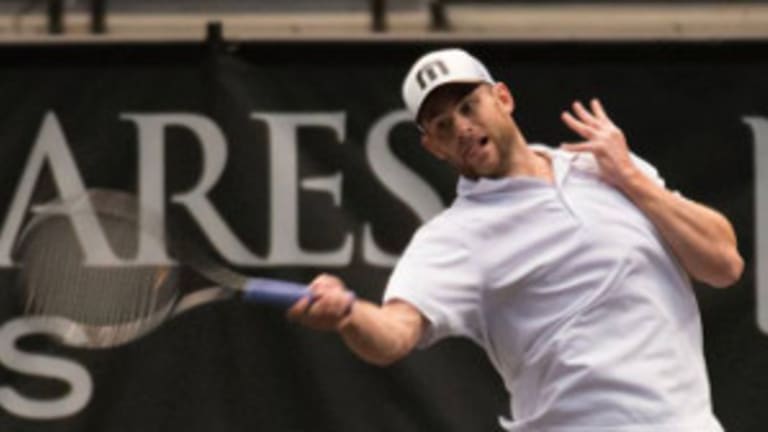DELRAY BEACH, Fla.—Jacob Goldman spent $5,000 and traveled 4,529 miles to fly from his home in Paris just to have a hit with Andy Roddick. Then, with Roddick as his partner for the Delray Beach Open Champions Tour pro-am, Goldman panicked.
“I’m just so nervous,” said the 60-year-old internet consultant, who claimed to be a 4.5 daily player, as he hit his fifth consecutive serve into the net. “I mean, I never miss my serve. But this was Andy Roddick.”
Even a year and a half after retiring from the sport, Roddick can have an intimidating effect on partners, as well as opponents. In the players’ lounge after the 31-year-old went 3-0 in an ATP Champions Tour event, defeating Mats Wilander, Mikael Pernfors, and Goran Ivanisevic (all in straight sets), 35-year-old tour veteran Michael Russell only half-joked as he implored Roddick to play doubles with him at this year’s U.S. Open.
“What, you want to guarantee you only get first-round prize money?” Roddick guffawed. Clearly, he no longer sees himself as any great threat, even if his serve can still top out at well over 120 M.P.H. with virtually no practice at all.
Roddick began his pro career in Delray Beach in 2000, fresh off a win at the Australian Open juniors, on a wild card given to him by tournament director Mark Baron. At the time, Roddick was a 17-year-old high school senior just down the road in Boca Raton, not the mega-millionaire, former world No. 1, U.S. Open champion, three-time Wimbledon/one-time U.S. Open runner-up (to Roger Federer every time), current radio talk-show host, and all-around bon-vivant that he is today.
“Probably the only thing I miss [about playing professionally] and the feeling you can’t replicate is the first five seconds after you’ve accomplished something that you’ve been working towards,” says Roddick, who won 32 tour titles, 612 matches, and more than $20 million in prize money over a 12-year career. “That moment of execution, I’ll never have that again. You can work in TV all you want but it’s not that do-or-die moment. The show’s gonna go on even if you mess up. It’s delivering in that big moment that I miss most.”
